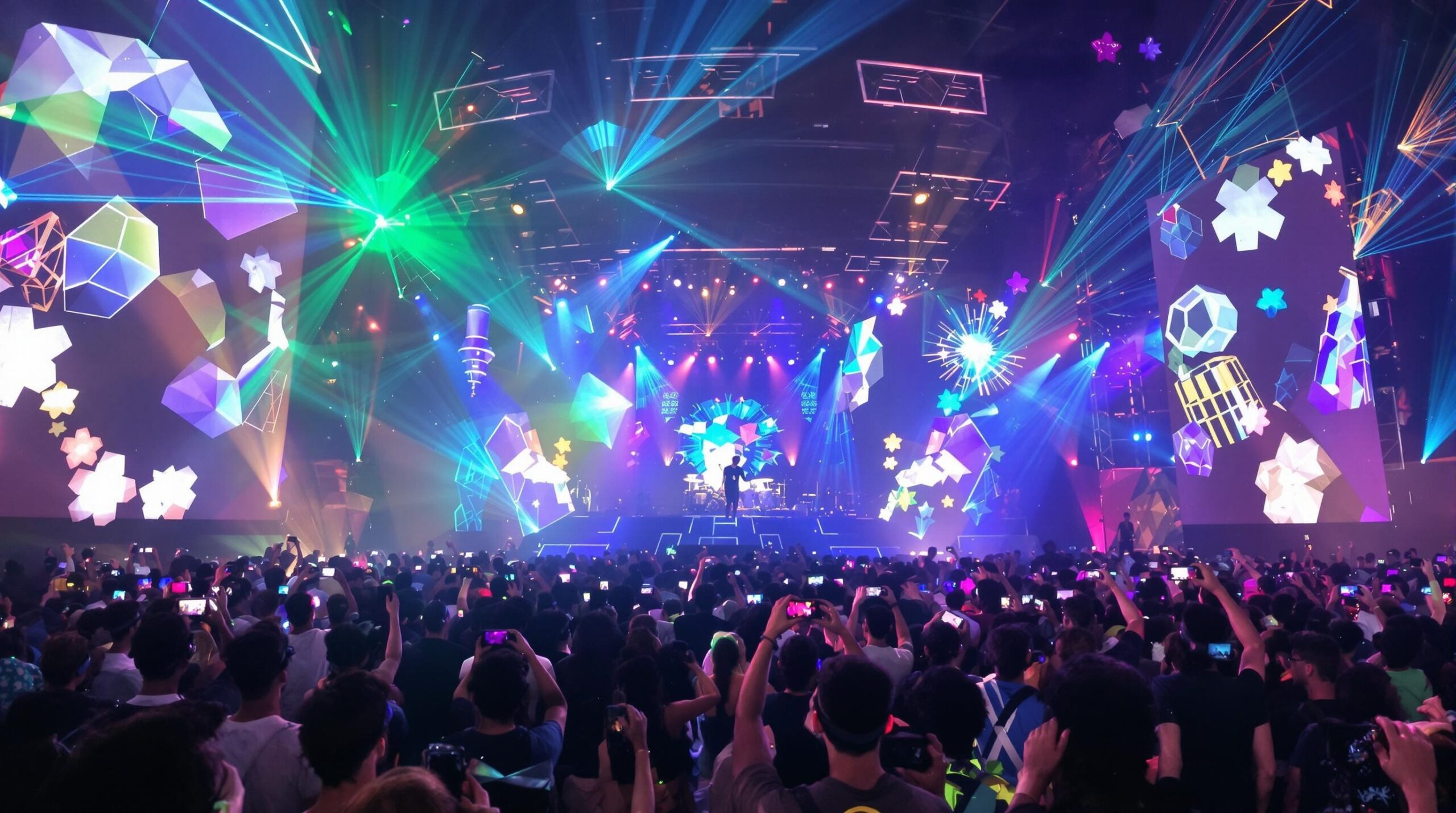The music industry is experiencing a revolutionary transformation due to the rise of virtual reality (VR) concerts. This innovative approach to live events offers unprecedented experiences for artists and audiences. As technology advances, VR pushes the boundaries of live performances and entertainment. This article explores VR’s impact and future potential in the music industry.
Understanding Virtual Reality Concerts
Virtual reality concerts employ digital environments to simulate live performances, allowing audiences to attend from anywhere worldwide. Attendees use VR headsets to immerse themselves in these virtual environments and experience the concert firsthand. Unlike traditional online streaming, VR concerts mimic being at a real-life venue. This includes spatial audio, 360-degree views, and interactive features with the performers.
Technology is crucial in replicating a live concert’s ambiance and energy within VR platforms. Companies like Oculus, HTC, and Valve have developed cutting-edge VR equipment to enhance these experiences. This technological foundation supports new opportunities for artists and audiences. VR concerts offer creative freedom for artists, fostering innovative performances and unique storytelling avenues.
Benefits of Virtual Reality Concerts
VR concerts create unparalleled access for fans who might otherwise not attend live performances due to geographical barriers or cost. Fans from around the globe can join these digital events without traveling, reducing the environmental impact of traditional concerts. This accessibility democratizes the concert experience and brings together diverse audiences, fostering a shared love for music.
Additionally, VR concerts offer artists innovative ways to engage their audiences and showcase creativity beyond physical constraints. Elaborate stage designs, outlandish costumes, and effects that defy the laws of physics become possible. Artists can experiment with their performances, creating unique and memorable experiences for attendees.
The substantial monetization opportunities in VR concerts offer new revenue streams for artists and industry professionals. Virtual merchandise, ticket sales, and exclusive content packages can generate income while expanding audiences globally. The affordability and many price points offer fans versatility and choice in concert experiences.
Pioneering Artists Embracing VR Concerts
Several pioneering artists have embraced VR technology, redefining the live music experience and setting the stage for future innovation. Early adopters like Björk, Gorillaz, and Imogen Heap have integrated VR elements into their performances. These forays illustrate the potential of VR concerts to complement artist creativity and audience engagement.
For example, in 2020, singer John Legend hosted a VR concert on Wave. The event attracted thousands of viewers worldwide, demonstrating the reach and appeal of VR technology. It featured interactive animations and audience participation, elevating traditional concert experiences.
Other prominent artists like Travis Scott and Ariana Grande have collaborated with VR platforms like Fortnite to stage virtual performances. These concerts reached millions of fans and further validated VR’s role in shaping the future of live music. With mainstream artists entering the VR space, the industry continues evolving rapidly.
The Challenges in Transitioning to VR Concerts
Despite considerable excitement, VR concerts present challenges that must be addressed to ensure long-term success. One significant challenge involves the limitations of current technology, such as device availability and connectivity issues. VR headsets can be costly, posing accessibility barriers for some fans. However, this constraint may lessen over time as technology becomes more widespread and affordable.
Additionally, VR concerts necessitate investments in high-quality production, which can pose financial and logistical challenges for artists and organizers. The cost and expertise needed to create engaging VR experiences may present obstacles for smaller artists or independent musicians. However, more affordable production tools may emerge as VR technology becomes mainstream.
The industry must also address data privacy and security concerns, safeguarding users against potential risks. As VR platforms collect user data, ensuring robust security measures remains crucial. Companies must remain vigilant in creating safe online environments for their users.
Future Prospects and Technological Advancements
The future of VR concerts looks promising, with further technological advancements poised to enrich live performances. Innovations such as haptic feedback gloves and motion capture suits allow attendees to interact dynamically with virtual environments. Improved graphics and audio will enhance immersive experiences, making them feel even more realistic.
Exciting developments include the integration of artificial intelligence and augmented reality into VR concert experiences, offering unprecedented possibilities to artists and audiences. Artificial intelligence may enhance concert curation and provide personalized experiences tailored to attendee preferences. Meanwhile, augmented reality can blend real and virtual worlds, enabling hybrid concert experiences that transcend traditional boundaries.
Continued investments in VR research and development will facilitate new features that enhance audience immersion and engagement. As VR technology evolves, its impact on the music industry will likely expand, bringing captivating experiences to audiences worldwide.
Conclusion
Virtual reality concerts transform the live music experience, offering exciting opportunities for artists and fans alike. As technology advances, VR concerts address accessibility issues and reimagine audience interactions while generating new revenue streams for musicians. Despite challenges, the future of VR concerts looks bright, with ongoing technological developments promising to enhance these experiences further.
Artists, industry professionals, and fans must embrace these changes and adapt to the evolving landscape of live performances. As virtual reality continues integrating into the music industry, audiences can expect even more captivating and immersive live music experiences. With continued innovation and collaboration, VR concerts are set to redefine the future of live entertainment and inspire the next generation of music enthusiasts.


